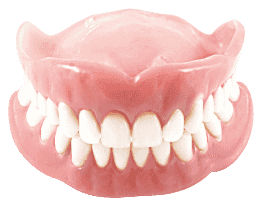











Complete dentures are still a very good option for replacing missing teeth.
There are two major and essential reasons for replacing dentures: aesthetic and functional (chewing). This is what I hear most often about aesthetic concerns: "My teeth have become too short," "they are too yellow," "my mouth is sinking in," "my lips are more wrinkled," "my teeth are disproportionate to my face..." As for functional complaints, the comments I hear are: "My teeth don't cut anymore," "my dentures have become unstable," "I'm always getting ulcers..."
In fact, there are only three types of dentures: centric dentures, semi-precision dentures and precision dentures, which are the final step before switching to implants becomes necessary.
To ensure that standard dentures are effective aids in chewing, it's preferable to have relatively high bone mass. If your bone resorption is too advanced, then it is better to opt for precision prostheses or dental implants.
Standard dentures can be designed using various types of material depending on the denturist. I use the highest quality materials so that my dentures last a long time and stay comfortable.
There are no better traditional dentures than precision dentures when you have high bone resorption and you don't want to have implants. These are the same types of prostheses that we make for dental implants. Precision dentures are bio-functional; that is, they more faithfully replicate chewing movements to increase comfort and stability, even for patients with high bone resorption. They are designed with the best materials available on the market. To make this type of prosthesis, we use teeth with an aesthetic and appearance that are incredibly natural.
